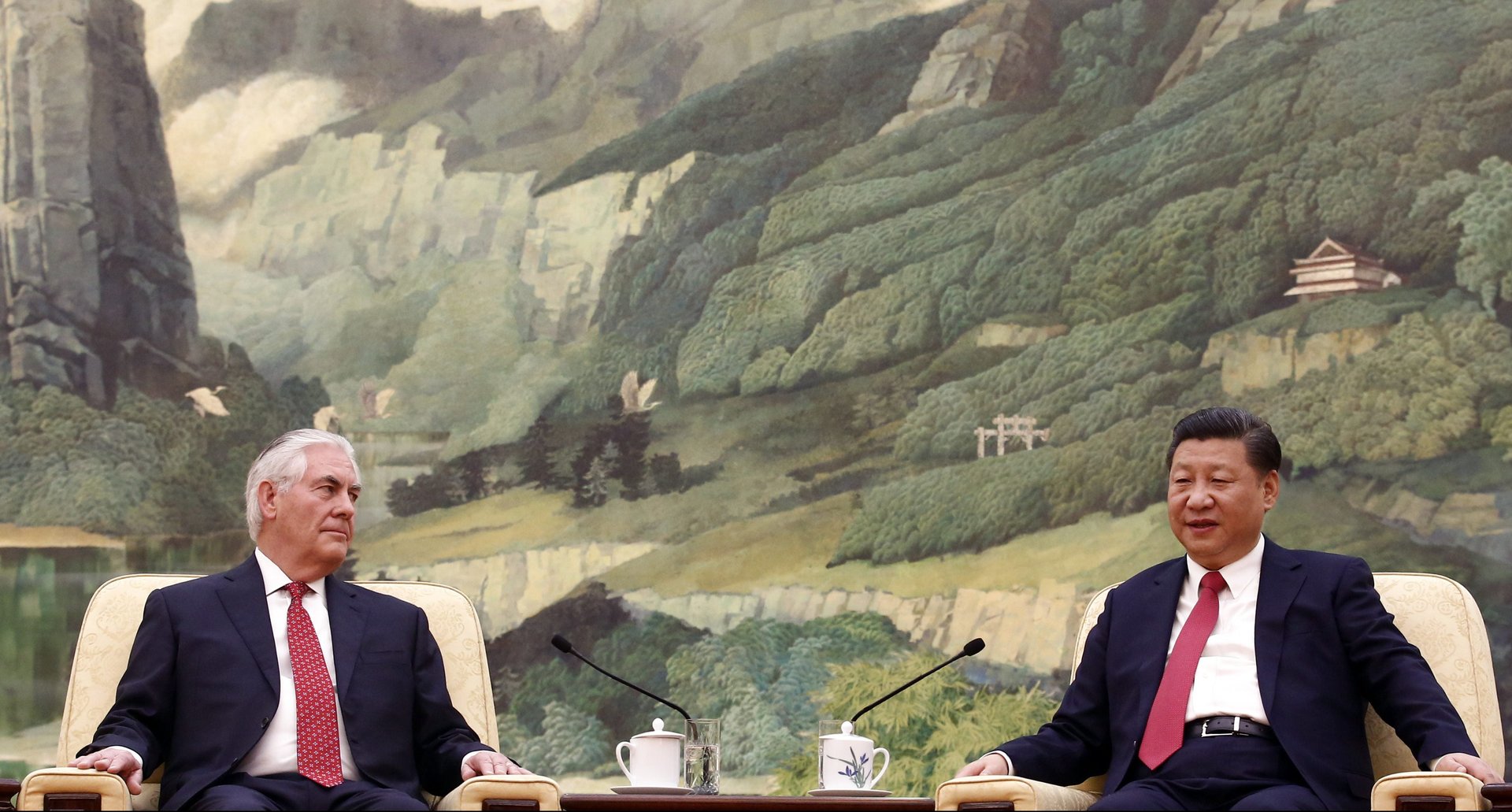Rex Tillerson’s tone on China got a lot friendlier once he actually got to China
US secretary of state Rex Tillerson met today (March 19) with China’s president Xi Jinping, which is the highest-level meeting between the Trump administration and Beijing to date. It is a significant moment in the relationship between the world’s two largest economies, one that has been tense (paywall) since Donald Trump took over the White House.


US secretary of state Rex Tillerson met today (March 19) with China’s president Xi Jinping, which is the highest-level meeting between the Trump administration and Beijing to date. It is a significant moment in the relationship between the world’s two largest economies, one that has been tense (paywall) since Donald Trump took over the White House.
The overarching goal of Tillerson’s visit in Beijing—his last stop on a trip across Asia—seemed to be to avoid controversy at all costs.
That was not an easy task. The visit came after Trump fired off an incendiary tweet criticizing China’s policy on North Korea, and after Tillerson himself endorsed that tweet in an interview. Tillerson had also criticized China while visiting Japan and South Korea.
The main purpose of Tillerson’s trip and his excessively friendly message may be to set an agreeable tone ahead of the suspected meeting between Xi and Trump in Florida next month. That meeting will be rife with controversial issues, which may include what to do about North Korea, Trump’s complicated relationship with the “One China” policy (of the utmost importance to Beijing), and Trump’s protectionism and general unpredictability on trade.
He hasn’t been so nice elsewhere on his Asia trip, though. Meeting with Japan’s foreign minister on March 16, Tillerson called for a dramatic overhaul of the US and China’s approach to North Korea, which he said had “failed” for 20 years. The next day in Seoul, Tillerson called on China to stop punishing South Korea for the deployment of THAAD, a US-led missile-defense system. The main purpose of THAAD—or Terminal High Altitude Area Device—is to protect South Korea from the increasingly powerful missiles being launched by its northern neighbor, but China views it as a challenge to its military interests in the South China Sea and elsewhere.
Tillerson’s remarks to Xi, however, made no mention of these issues. Only in a press conference with Chinese foreign minister Wang Yi did he reaffirm that their North Korea policy has ”not succeeded.” His bland comments to Xi were:
President Xi, thank you so much for that very warm welcome, and for receiving me in Beijing on this, my first visit to China as Secretary of State.
President Trump places a very high value on the communications that have already occurred between yourself and President Trump, most particularly the very lengthy telephone conversation, where there were very good exchanges to improve the understanding of China’s view of the relationship with the United States, and President Trump’s view, as well. And he looks forward to enhancing that understanding, and the opportunity for a visit in the future.
We know that, through further dialogue, we will achieve a greater understanding that will lead to a strengthened — strengthening of the ties between China and the United States, and set the tone for our future relationship of cooperation.
I appreciate very much the time that Foreign Minister Wang and Senior Councilor Yang have extended to me on this visit. We had very comprehensive dialogue regarding important areas for future discussion, and also important elements to ensure a successful visit in the future.
Tillerson’s innocuous statement shows that the US administration is not likely to publicly back up the harsh attacks Trump regularly lobs at China. The New York Times reported that the statement was ”designed to give China ‘face,'” citing an anonymous diplomat in Beijing. This is especially necessary given that Trump is among the most strident China-bashers in Washington, DC, and has hired several others.
Comments from Tillerson even went so far as to adopt the bizarre, empty diplomatic phrases the Chinese Communist Party always rolls out, like ”win-wins” and “mutual respect.” Observe the similarities between another statement from Tillerson to Wang, and one given from Xi to president Obama in 2014:
Tillerson, 2017: [The] US-China relationship [began] now over 40 years ago with the historic opening between the US and China, and through that period, it has been a very positive relationship built on non-confrontation, no conflict, mutual respect, and always searching for win-win solutions.
Xi, 2014: Ladies and gentlemen, friends, China is ready to work with the United States to make efforts in a number of priority areas and putting into effect such principles as non-confrontation, non-conflict, mutual respect, and win-win cooperation.
All of this doesn’t mean that hairier issues weren’t discussed privately, however. For example, in the press conference with Wang, Tillerson said that the United States will “continue to advocate for universal values such as human rights and religious freedom,” which suggests he may have pressed these controversial pillars of American foreign policy in private.
But for now, the Trump administration seems capable of keeping any controversies behind closed doors. We’ll see what comes out of Xi’s visit to Mar-a-Lago next month.